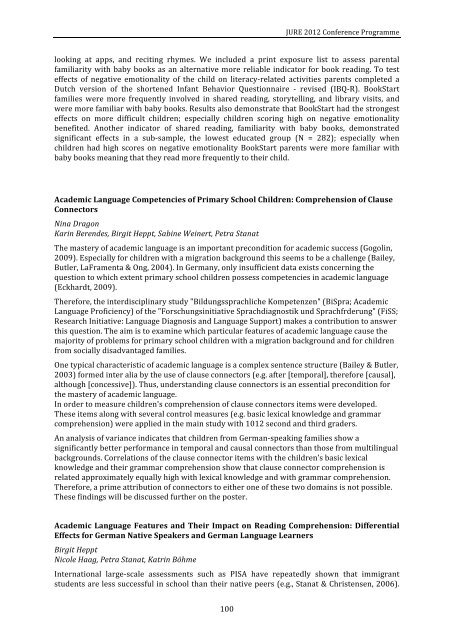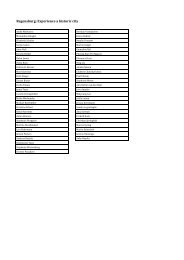JURE 2012 Programme book - EARLI Jure 2012
JURE 2012 Programme book - EARLI Jure 2012
JURE 2012 Programme book - EARLI Jure 2012
Create successful ePaper yourself
Turn your PDF publications into a flip-book with our unique Google optimized e-Paper software.
100<br />
<strong>JURE</strong> <strong>2012</strong> Conference <strong>Programme</strong><br />
looking at apps, and reciting rhymes. We included a print exposure list to assess parental<br />
familiarity with baby <strong>book</strong>s as an alternative more reliable indicator for <strong>book</strong> reading. To test<br />
effects of negative emotionality of the child on literacy-‐related activities parents completed a<br />
Dutch version of the shortened Infant Behavior Questionnaire -‐ revised (IBQ-‐R). BookStart<br />
families were more frequently involved in shared reading, storytelling, and library visits, and<br />
were more familiar with baby <strong>book</strong>s. Results also demonstrate that BookStart had the strongest<br />
effects on more difficult children; especially children scoring high on negative emotionality<br />
benefited. Another indicator of shared reading, familiarity with baby <strong>book</strong>s, demonstrated<br />
significant effects in a sub-‐sample, the lowest educated group (N = 282); especially when<br />
children had high scores on negative emotionality BookStart parents were more familiar with<br />
baby <strong>book</strong>s meaning that they read more frequently to their child.<br />
Academic Language Competencies of Primary School Children: Comprehension of Clause<br />
Connectors<br />
Nina Dragon<br />
Karin Berendes, Birgit Heppt, Sabine Weinert, Petra Stanat<br />
The mastery of academic language is an important precondition for academic success (Gogolin,<br />
2009). Especially for children with a migration background this seems to be a challenge (Bailey,<br />
Butler, LaFramenta & Ong, 2004). In Germany, only insufficient data exists concerning the<br />
question to which extent primary school children possess competencies in academic language<br />
(Eckhardt, 2009).<br />
Therefore, the interdisciplinary study "Bildungssprachliche Kompetenzen" (BiSpra; Academic<br />
Language Proficiency) of the "Forschungsinitiative Sprachdiagnostik und Sprachfrderung" (FiSS;<br />
Research Initiative: Language Diagnosis and Language Support) makes a contribution to answer<br />
this question. The aim is to examine which particular features of academic language cause the<br />
majority of problems for primary school children with a migration background and for children<br />
from socially disadvantaged families.<br />
One typical characteristic of academic language is a complex sentence structure (Bailey & Butler,<br />
2003) formed inter alia by the use of clause connectors (e.g. after [temporal], therefore [causal],<br />
although [concessive]). Thus, understanding clause connectors is an essential precondition for<br />
the mastery of academic language.<br />
In order to measure children's comprehension of clause connectors items were developed.<br />
These items along with several control measures (e.g. basic lexical knowledge and grammar<br />
comprehension) were applied in the main study with 1012 second and third graders.<br />
An analysis of variance indicates that children from German-‐speaking families show a<br />
significantly better performance in temporal and causal connectors than those from multilingual<br />
backgrounds. Correlations of the clause connector items with the children’s basic lexical<br />
knowledge and their grammar comprehension show that clause connector comprehension is<br />
related approximately equally high with lexical knowledge and with grammar comprehension.<br />
Therefore, a prime attribution of connectors to either one of these two domains is not possible.<br />
These findings will be discussed further on the poster.<br />
Academic Language Features and Their Impact on Reading Comprehension: Differential<br />
Effects for German Native Speakers and German Language Learners<br />
Birgit Heppt<br />
Nicole Haag, Petra Stanat, Katrin Böhme<br />
International large-‐scale assessments such as PISA have repeatedly shown that immigrant<br />
students are less successful in school than their native peers (e.g., Stanat & Christensen, 2006).



